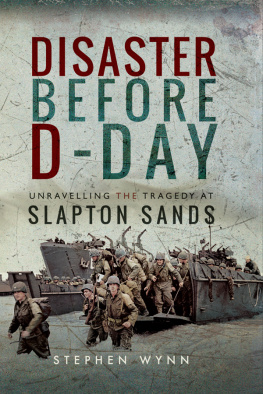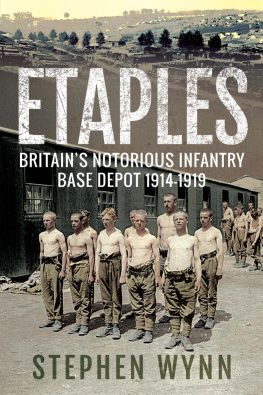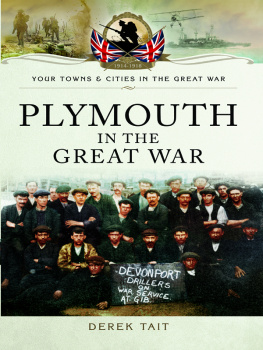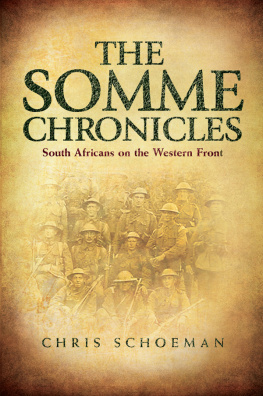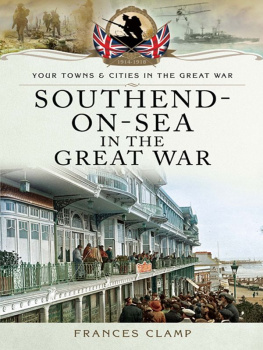Your Towns and Cities in the Great War
Folkestone
in the Great War
Your Towns and Cities in the Great War
Folkestone
in the Great War
by Stephen Wynn
First published in Great Britain in 2017 by
PEN & SWORD MILITARY
an imprint of
Pen and Sword Books Ltd
47 Church Street
Barnsley
South Yorkshire S70 2AS
Copyright Stephen Wynn, 2017
ISBN 978 1 47382 792 9
eISBN 978 1 47386 502 0
Mobi ISBN 978 1 47386 501 3
The right of Stephen Wynn to be identified as the author of this work has been asserted by him in accordance with the Copyright, Designs and Patents Act 1988.
A CIP record for this book is available from the British Library
All rights reserved. No part of this book may be reproduced or transmitted in any form or by any means, electronic or mechanical including photocopying, recording or by any information storage and retrieval system, without permission from the Publisher in writing.
Pen & Sword Books Ltd incorporates the imprints of
Pen & Sword Archaeology, Atlas, Aviation, Battleground, Discovery, Family History, History, Maritime, Military, Naval, Politics, Railways, Select, Social History, Transport, True Crime, and Claymore Press, Frontline Books, Leo Cooper, Praetorian Press, Remember When, Seaforth Publishing and Wharncliffe.
For a complete list of Pen and Sword titles please contact
Pen and Sword Books Limited
47 Church Street, Barnsley, South Yorkshire, S70 2AS, England
E-mail:
Website: www.pen-and-sword.co.uk
Authors biography
Stephen is a happily retired police officer having served with Essex Police as a constable for thirty years between 1983 and 2013. He is married to Tanya who is also his best friend.
Both his sons, Luke and Ross, were members of the armed forces, collectively serving five tours of Afghanistan between 2008 and 2013. Both were injured on their first tour. This led to his first book Two Sons in a Warzone Afghanistan: The True Story of a Fathers Conflict , published in October 2010.
He has a teenage daughter, Aimee, who currently attends secondary school.
Both of his grandfathers served in and survived the First World War, one with the Royal Irish Rifles, the other in the Mercantile Navy. His father was a member of the Royal Army Ordnance Corps during the Second World War.
Stephen collaborated with one of his writing partners, Ken Porter, on a previous book published in August 2012, German POW Camp 266 Langdon Hills , which spent six weeks as the number one bestselling book in Waterstones, Basildon between March and April 2013. Steve and Ken collaborated on a further four books in the Towns & Cities in the Great War series by Pen & Sword. Stephen has also written other titles for the same series of books.
Stephen has also cowritten three crime thrillers which were published between 2010 and 2012; they centre around a fictional detective named Terry Danvers.
When he is not writing, Tanya and he enjoy the simplicity of walking their four German Shepherd dogs early each morning when most sensible people are still fast asleep in their beds.
CHAPTER ONE
A Brief History of Folkestone and the Outbreak of War
Folkestone became one of the most important British towns of the First World War, mainly due to the fact that it was in the part of the country nearest to the fighting in Europe and the shortest crossing point between England and France. The shorter time that a boat was in the water carrying thousands of men and nurses across the English Channel, the less opportunity there would be for a German U-Boat to attack it.
Before the war Folkestone had been a well established and much loved holiday destination for thousands of people searching for a brief escape from the drudgery and harshness of everyday life, especially those from London; the air which they breathed for most of their lives was far from clean and fresh. It was difficult to find a more enjoyable and more agreeable location to visit than Folkestone, with its unpolluted air, its gentle sea breezes, its sun-kissed beaches and its tastefully decorated seafront promenades.
People could take a leisurely stroll along the Leas, taking in the simple but breathtaking views as they looked out to sea. The harbour was always a hive of activity with fishing boats coming and going with the tides. The beach area was awash with traders trying their best to make a few pennies from the hordes of holidaymakers who poured into the town nearly every day, especially through the summer months and at weekends.
For the more affluent holidaymaker, there was the opportunity to catch a passenger ferry across to France for a day trip or a longer stay. With the outbreak of the war in August 1914, and for the next four and a half years, Folkestone wouldnt quite be the same place.
When the possibility of war became a reality, Folkestone suddenly had to address an issue which had never been a problem before. This was about the German and Austrian residents who lived in Folkestone, most of whom either worked in service or in one of the towns hotels.
The Illustrated War News of 12 August 1914 carried an article, with a photograph, about German reservists who had been detained at Folkestone Harbour after they were prevented from catching a ship to Flushing in Holland, from where they would have made their way back to Germany, having either been called up by the German authorities, or wanting voluntarily to enlist in the German Army.
A total of 285 German men of enlistment age were detained on the grounds that the time period allowed for enemy aliens to leave Great Britain had expired. It was suggested that most of the men did not appear too perturbed when told by British military authorities that they were not going to be allowed to return to Germany and instead were going to be detained. They were marched off, through the town, to Shorncliffe Barracks. It was a warm sunny day and the large group of Germans were flanked on either side by British Tommys, with their Lee Enfield rifles slung across their left shoulders, bayonets fixed. None of the German Reservists were carrying any luggage or any other items of private property, this was placed in motor vehicles and driven to Shorncliffe camp to be collected on their arrival. The newspaper article included a statement which had been issued by the Home Secretary on 10 August 1914 to address the issue of enemy aliens:

German Reservists being marched off to Shorncliffe Barracks (The Illustrated War News)





